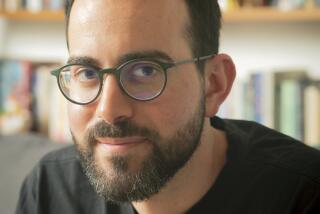DNA Nobel Winner Asks Big Questions : Science: Today Dr. Francis Crick is busy wading into other scientific swamps: How did the Earth come about? What are dreams? How does the brain work?
- Share via
LA JOLLA, Calif. — You go to the grocery store and find new, redder, longer-lasting tomatoes. You come home and turn on the television and find lawyers discussing O. J. Simpson blood tests.
What’s the connection?
A 77-year-old man with shaggy white eyebrows and an impish grin--Dr. Francis Crick.
Forty years ago, Crick and a fellow researcher unveiled the intertwined spiral model we now identify as DNA, which holds the coding that makes some of us blond and others brunette.
But these days, as the DNA frontiers continue to explode around him, Crick has only a “distanced” interest in the subject.
He is too busy wading into other scientific swamps, seeking answers to Big Questions that haunt inquiring minds: How did Earth come about? What are dreams? How does the brain work?
Unlike many other scientists, Crick, who was born in Britain and lived there until he was 60, rarely sets foot in a lab or a classroom.
“Essentially I read and think,” says the affable but media-shy Crick, showing a reporter a stack of research papers with esoteric titles and offering wryly to loan him one.
And then he writes books.
In one, Crick postulates that the Earth began when microorganisms were dropped by a spaceship from a higher civilization.
In another, he theorizes that dreams are not the tangle of emotions and hidden drives psychoanalysts would have us believe. Rather, he writes, their function is to allow the brain to flush itself so one’s memory can function the following day.
Crick admits that some of his offerings are a bit “out there,” a tad “speculative.” Some, he even says, he might like to revise. But it doesn’t bother Crick, the recipient of a 1962 Nobel Prize for his DNA work, that some of his musings may turn out to be wildly off the mark.
“A man who is right every time is not likely to do very much,” he says, sitting in his Salk Institute office, a serene and cozy wood-paneled room with views of the Pacific Ocean.
It wasn’t until about 20 years after Crick and partner James Watson discovered the molecular structure of DNA that their conclusions were firmly established. At the time, says Crick, only a small number of people “even thought it was interesting.”
That’s the way science works, he explains. You make a discovery, you generate a theory. Sometimes it works, more often it doesn’t. Sometimes you don’t live long enough to find out.
It’s true that without the 1953 Crick-Watson research, the world probably wouldn’t be eating plumper, redder tomatoes or watching lawyers feud over Simpson blood tests results.
But this new power--the power to manipulate genes--also has led to raging debates about whether scientists will someday be breeding human beings, too.
“Think of the effect television has had worldwide on politics,” said Crick. “You can’t possibly expect the man who invented the transistor to have seen that.
“You can just reckon that any powerful technique you invent, even if it is beneficial, is going to have effects much wider than you think, and it’s going to have some disadvantages.”
Crick’s latest trek into the unknown is the book “The Astonishing Hypothesis: The Scientific Search for the Soul.” Its central tenet--that everything we see, feel and think is nothing more than the behaviors of a pack of neurons and molecules--is vintage Crick.
If true, it would mean that things like sadness or desire are not attributable to some inner spirit or will, but caused by brain chemistry.
“Can you explain why blue looks blue?” asks Crick. “It’s no use saying the sky looks blue. That doesn’t say why it looks blue. Why doesn’t it look red? . . . That’s a very difficult question.
“We are trying to go around that and find out what happens in your head when you see blue. Maybe that will give us a clue to answer these difficult questions.”
Crick says he enjoys his life. He still comes to the office daily and often stays for the full day, although he has no official duties.
He professes to be irritated by interruptions of any sort--especially of the media variety. Nonetheless, he remains witty and charming throughout an hourlong interview.
“You see, I’m one of these people who is against communication,” he says in British tones that are part Oxford don, part Monty Python.
“I want less communication because far many more people want to communicate with me than I want to communicate with.”
As for the Nobel, well, he’s found it can be very helpful when trying to secure a visa in a hurry. But other times, he says, it’s a real albatross.
“If you go out to dinner, it’s a good idea to conceal the fact that you’ve got a Nobel Prize,” he explains. “Otherwise they don’t know what to say.”






